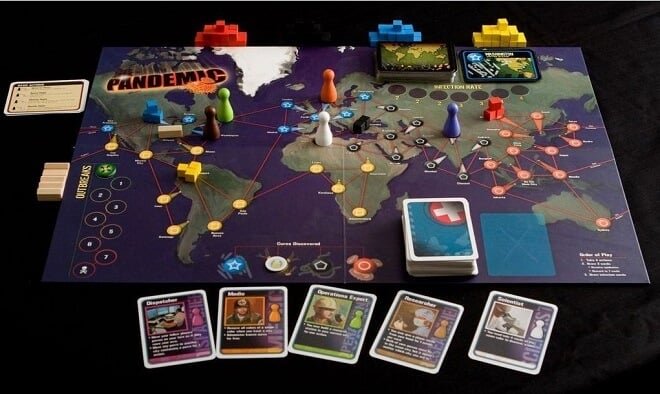Board games have, over the years, found a niche in American homes as an avenue of merriment, socialization, as well as strategic capacities. The interest in multiplayer board games USA is not weakened by the digitalization process, but still has modern shades. People unite in the game room to play games using boards, which can be real and online: those are mostly family and friends, but coworkers, too. These games do not end with a win or a loss: they entail socialization, thinking, and team spirit. Ranging between classics and new-age strategy games, the variety of multiplayer board games has vastly grown, which makes them accessible to people of various ages and interests. The social component in such games is highly crucial in their recent increase in popularity, particularly when society requires a deeper sense of entertainment in the face of electronic distractions.
- Evolution of Board Gaming Culture in the USA: In the past, board games were thought to be played with conventional setups that included real boards, dice, and tokens. But throughout the years, the board game culture in the United States has changed significantly. The scene has evolved since the introduction of the gaming cafes and board game conferences as well as specialist groups, which started as an informal activity amongst families to competition and hobbyist playing. The increased popularity of strategy games, role-playing games, and storytelling has led to this shift, prompting the development of complex games capable of accommodating multiple players and hours of gameplay. A wide variety of multiplayer board games, including cooperative adventures, bluffing games, deduction-based games, and party-friendly forms, are now owned by many American homes.
- The Digital Shift: Online Ludo Board Game USA: The emergence of smartphones and online gaming sites has created a new dwelling place for the classical board games. A good example of this development can be seen in the way Ludo(a board game that was rediscovered and re-found its audience, both among new and nostalgic players) in the USA became resurrected. Initially, being applied on a digital form as an adaptation of the ancient Indian game Pachisi, Ludo was designed to fulfill the demands of the modern rushing world. The simplicity of the game, its colourful design, and the possibility of applying a multiplayer option, which allows participating friends and family to either compete with one another or even collaborate irrespective of the distance that separates them, are the key attractions of this game. Competitive leaderboards, emoticons, and chat, commonly numerous online versions, provide interaction that is higher than in the real version.
- Impact of Technology on Multiplayer Board Gaming: Although digital board games are quite popular, technology has improved board games rather than replacing them. Other board games are also getting to incorporating virtual reality (VR) and augmented reality (AR) to generate immersive experiences. Apps enable players to cope with the pieces, record the scores, and update or expand the app. Additionally, online forums and platforms hold tournaments, provide strategic advice, and create communities centred around certain games. This has caused hybrid format games that can be played both online and physically, providing flexibility and a wider audience to emerge in the USA. Players now exchange game evaluations, wins, and strategies on social networking channels as well, fostering an environment where playing multiplayer board games is more than simply an activity.
- The Cultural Relevance of Ludo in the USA: Even though it has Eastern roots, the essence of the Ludo game is self-explanatory since it is popular all over the USA. The game includes fairness, luck, and strategy, the three things all of which can be understood easily and are enjoyable to master. Ludo can be played by a wide variety of individuals due to the short matches, global multiplayer options provided in the game, and interesting graphics. During the lockdown in the USA, Ludo became an unexpected online hit that played the role of a social substitute for in-person meetings. Additionally, it is utilised in educational and
- Community and Competition in Multiplayer Games: One of the outstanding characteristics of a multiplayer board game is the ability to create a common experience. Such games encourage dialogue, development, and humour in the players, both in the real and online world. The gaming community has been successful in the USA as gamers have organised game evenings, hosted meetings, and even board game festivals. The competitive nature of these games, and in particular, online versions, such as online Ludo, makes these games addictive. Leaderboards, win ratios, and unlocking elements encourage players to expand their abilities and master the rest. Multiplayer board games, though, contain all the avenues of cooperation, empathy, and understanding in addition to the competition, which is gaining growing significance in the divided world.
- Educational and Cognitive Benefits of Multiplayer Board Games: In the USA, multiplayer board games are becoming acknowledged for their cognitive and educational advantages in addition to their entertainment value. These games improve communication, memory, and strategic thinking. Board games are being included in the curriculum of many educational institutions and schools to foster in their students a sense of collaboration and critical thinking. Young children may learn counting, planning, and the fundamentals of probability entertainingly and engagingly by playing games like online Ludo. In the meantime, bargaining, risk assessment, and innovative problem-solving are taught through increasingly challenging multiplayer games. Board games have been shown to help elderly populations maintain cognitive health, lower stress levels, and foster much-needed social engagement.
Ludo board game online USA seems to have a bright and broad prospect in the USA. The genre continues to transform as both creativity and technology converge into the development of new experiences that can find their way into not only modern gamers but also traditionalists. With the web, games such as Ludo have become accessible and globally linked, more so, and hence ensuring that games remain relevant in this world today. The nature of the board games, as they have it now, though, has not changed much, which was to facilitate interpersonal relations. Board games (table or screen) allow people to physically and emotionally connect so much to mutual challenge, learning, and enjoyment that they bridge the distance typically felt in a societal structure where many people often feel quite alienated. The perennial obsession with its throws of a die, a movement, and a turn, will always keep the board games as the basic element of life, despite the changing trends.

